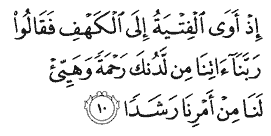Forever Young, Jihad Of The Eyes, Foreboding
Issue 636 » June 3, 2011 - Rajab 1, 1432
Living The Quran
Forever Young
Al Kahf (The Cave) - Chapter 18: Verse 10
 'When the young men took refuge in the cave and said: "Our Lord! Grant us mercy form Your Presence and arrange for us in your affair what is right and good!"'
'When the young men took refuge in the cave and said: "Our Lord! Grant us mercy form Your Presence and arrange for us in your affair what is right and good!"'
The word used to mean young (fata) in this verse has a special meaning and usage in Islamic literature. Its definitive form futuwwah, meaning youth and chivalry, is a composite of virtues, such as energy, revolutionary vigour, heroism, generosity, modesty, chastity, trustworthiness, loyalty, mercifulness, knowledge, humility, and piety.
Futuwwah also signifies a selfless character that enjoys helping others, wishing no one any harm. It is an important, indispensable dimension of good conduct and a significant aspect of humanity.
Derived from fata meaning young man, futuwwah has become a symbol of rebellion against all kinds of evil and of sincere servanthood to God as the way to attain true freedom.
Some have summed up the descriptions made for futuwwah in the following cardinal virtues, in addition to those mentioned above:
- Forgiving when one is able to punish.
- Preserving mildness and acting mildly and gently when one is angry.
- Wishing well for all, including one's enemies, and doing good.
- Always being considerate of the well-being and happiness of others first, even when one is needy.
The signs of one being a fata (young, chivalrous one) are that their spirit, which was created with the potential to accept Divine Oneness and Islam, has utmost conviction of Divine Oneness and urges them to live according to the requirements of this conviction, and that, without being captivated by carnal or bodily desires, they live a pure, spiritual life, always aiming to please God in all acts, thoughts, and feelings. It is not possible for one who cannot be saved from the temptations of their carnal soul, from Satan, from bodily appetites, and from a love of the world or attachment to worldly life, to climb up toward the peak of futuwwah.
Compiled From:
"The Quran: Annotated Interpretation in Modern English" - Ali Unal, pp. 601
Understanding The Prophet's Life
Jihad Of The Eyes
Many of us may wonder what’s wrong with lustfully staring at the attractive features of another person? Perhaps one saying of our beloved Prophet Muhammad (peace be upon him) sums it all:
“The furtive glance is one of the poisoned arrows of Satan, on him be God's curse. Whoever forsakes it for the fear of Allah, will receive from Him (Great and Gracious is He) a faith, the sweetness of which he will find within his heart.” (al-Haakim.)
A Muslim is decent and pure. This means all of his or her body must be decent and pure. A natural consequence of this is lowering the gaze.
Looking at another man or woman in an indecent manner is following in Satan's footsteps.
It all begins with a lustful glance. Such a glance leads to lustful talk and flirting, then meeting…and we are all aware of what comes next.
Let us stop Satan in his tracks and lower our gaze.
Let us start today, during these hot summer months. Yes, it is very difficult and it takes discipline and faith.
Yet, whenever we struggle to please Allah, He will reward us several times over in this life and the next.
It is truly a Jihad. But, it is a Jihad worth undertaking, and we will be all the better for it.
Compiled From:
"The Jihad of the eyes - start today!" - Hesham Hassaballa
"Watch Out for The Arrow" - Young Muslims Publications
Blindspot!
Foreboding
There are two types of foreboding (tatayyur). One is based on normative experience observing things that consistently happen. For example, getting near a cobra usually results in it striking its victims. So when you see a cobra, get out of the way. There is no superstition in that. But it differs completely from some practices like avoiding walking under a ladder, staying clear of a black cat, and the culture that has evolved around the number 13 and its association with bad luck. These superstitions emanate from having a bad opinion of God, not recognizing His power and authority in the world, and attributing power to inanimate objects and delving into other similar practices. These superstitions are explicitly forbidden in Islam. While these practices have taken an aura of innocence and light humour, they are nonetheless connected to their pagan and idolatrous ancestry.
The way to cure this trap of superstition is for one to simply persist in what he was doing when confronted with something viewed as a bad omen. Altering one's course of action because of some perceived omen is admitting that the superstition has power.
Compiled From:
"Purification of The Heart" - Hamza Yusuf, pp. 91, 92